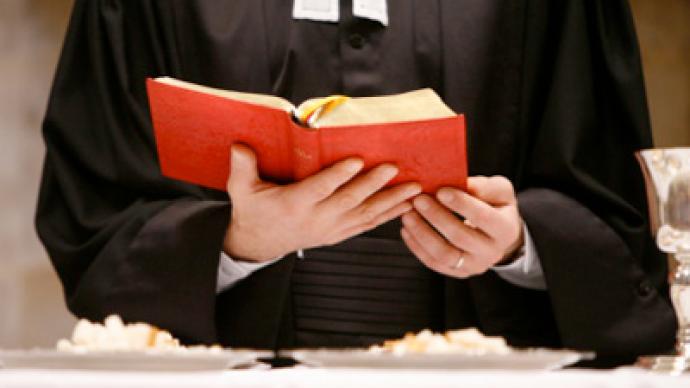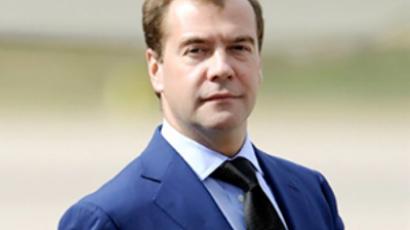Finnish priest persecuted for speaking out against terrorists

A priest in Finland is being accused of inciting religious hatred after he described one of the world's most-wanted criminals as a 'terrorist'.
Police have questioned Pastor Juha Molari after he gave an interview to RT in which he discussed Doku Umarov, the man behind the Moscow metro and airport bombings.Russia's number one outlaw Chechen terrorist Doku Umarov is also high-up on the international most-wanted list. But it seems one of Russia's neighbors isn't interested in helping bring him to justice.“I use the word terrorist. They use the word president,” Molari explains.The pastor has been a long-time critic of a website called the Kavkaz Center, where extremists freely express their views.The site was the first to publish the terrorist's words on the attacks claimed by Umarov, and is banned in many European countries but freely operates in Finland.Apart from facing being defrocked for speaking out against Doku Umarov and his internet mouthpiece, Juha Molari is receiving threats of a different kind. “We advise you to stop your activity against the Kavkaz Center. If you don’t come to your senses we’ll cut off the heads of you and your family”, one of them says.
Promoting terrorism against Russia
Johan Backman, the chairman of the Finnish-Caucasus Friendship Society, says the case reflects anti-Russian feeling in the EU.“He has told the Finnish public the truth about the activities of Doku Umarov in Finland because in Finland, the information channel of terrorists, the so-called Kavkaz Center has been operating for several years without any kind of reaction from the government or officials of Finland,” Backman said. “Of course this raises questions about whether Finnish authorities and the government of Finland are promoting terrorism against Russia.”“I would say the reason is in the lobby –there is a very strong anti-Russian lobby going on in the European parliament and through all the EU member states across Europe. They are trying to recruit politicians, journalists and other people to carry out these anti-Russian activities and anti-Russian propaganda,” Johan Backman revealed.
Double standards promote international terrorism, says Gennady Gudkov, the Deputy Head of Russia's State Duma Security Committee. Gudkov also remarked it is alarming that Finland is among the countries which call Chechen terror a liberation movement.“Terrorism is terrorism, no matter how it’s disguised,” says Gudkov. “It is a menace to all of mankind. Double standards are the reason terrorism still exists. Once a country labels militants from illegal armed groups who commit terror attacks against innocent people as terrorists, for another country to proclaim them freedom fighters is just despicable. I never expected anything like this from the Finnish authorities.”
Giving a green light to terrorists
Claude Moniquet, who analyses global terrorism and conflict, told RT that by allowing extremist websites, European countries are giving a green light to terrorists.“Europe does not understand, most of the open countries do not understand that there is a clear link between terrorist action and terrorist propaganda. And that terrorist propaganda or information is a part of global terrorist action,” he said.“Some people in the intelligence community say: look, we need to keep them open because by keeping them open we could scrutinize what they do, could get a global view on their acquaintance, we can see exactly with which organizations they are in touch and that helps the global counter-terrorism struggle. This is an argument I heard even before the Internet existed and I was never convinced,” shared Claude Moniquet, adding that just collecting intelligence on terrorists and doing nothing is a counter-productive policy.
The one man stand
The Kavkaz-Centre site was the first to publish the terrorist's words on the attacks he claims – the Beslan school siege, the Nevsky express and Moscow metro bombings, and most recently – the Domodedovo airport attack.The website is banned in Russia, but in Finland it enjoys quite a comfortable standing not only on the Internet, but also in downtown Helsinki.The priest was the first to openly say this was an outrage, and the reaction was quick to follow.He got an e-mail apparently from Dagestan saying that if he doesn’t “stop fight against Kavkaz-Centre, they will cut his head off and his family.”Juha Molari went to police, but instead ended up being persecuted himself. The Lutheran Church now wants to defrock him for promoting religious intolerance. He's also being sued for criticizing, what Finland calls, a legally operating organization.“The same people that are promoting terrorists against Russia, they’re influencing public opinion, claiming that Molari is a racist, that he delivers racist statements against the Caucasus people. But Molari is only stating an acknowledged fact that Doku Umarov is an international terrorist,” says Johan Beckman, Chairman of the Finnish-Caucasus Friendship Society.In Russia a manhunt is on for Umarov, and people close to him. But in Helsinki you may end up dining next to his relatives.“For example, Ruslan Umarov, who’s a brother of Doku Umarov. Officially, he lives in Stockholm, but now he doesn’t live with his own family. And we can meet him quite often in Helsinki,” says Molari.People walking down these quiet and prosperous streets may be unaware of the disturbing case of Juha Molari.They’re used to thinking of their country as fair and politically correct, but would they remain just as neutral if tragedy knocked on their door? People travel on public transport without fear in Helsinki. Their neighbors in Russia, only 400 km away, aren’t quite so lucky. Does a terrorist act have to happen on this platform for the Finnish government to wake up to the danger?After all it's only a step from extremist rhetoric to action. And there's seldom a warning call. “We’re fighting against the minority. A strong minority, who want to do terrible things against people. They don’t really know the reason why. But they think it’s justified. And it is disturbing that there’re so many people that keep the website going. And they’re not just anti-Russian, they’re anti-Western,” says Asher Pirt, a Researcher for The British East West Center.There’s quite a team after the pastor now – Finland's Prosecutor's Office, the Church, and some of the world's most uncompromising terrorists.Juha Molari has already changed his address, and divorced his wife to avoid putting her and his children at risk. He's now considering a move to Russia.“We have double morality. We have right to criticize and speak terrible things about Russians and Russia, but when we criticize Finland, it’s very, very strong attacks against us,” he sighs.The Finnish priest has been summoned to a police station after RT broadcast his story, said Finnish human rights activist and the Chairman of the Finnish-Caucasus Friendship Society.Johan Backman in a telephone conversation with RIA Novosti news agency.“As a result of his (Molari's) interview with RT, Eva Biaudet, the Finnish Minority Ombudsman has demanded that a criminal case be opened against Juha Molari on the charges of “instigating national hatred” against the Chechen people. The police have immediately summoned Molari for questioning today at 3 pm Finnish time” said Backman.
Petri Krohn, from the Finnish Anti-Fascist Committee, believes that this situation is part of a coordinated campaign to support the activities of the Kavkaz-Centre.website in Helsinki, “The Chechen separatists have wide political support in Finland. It is related to the anti- Russian attitude here in Finland – anything that is bad for Russia is good for Finland” says Kroohn. “The fundamental change in the attitude between Russia and Finland is related to the ethnic conflict in the Baltic states” believes Krohn.
After being released from the police station, Reverend Molari told RT he believes the current situation has a political pretext “I feel the situation in Finland is strange. I feel that people support me, but silently. I feel that there are no aggressive attacks between Russians or Finns ,but there are some people who are so aggressive to support the extremists. And when I opened this question to public, they became very nervous about this.”













